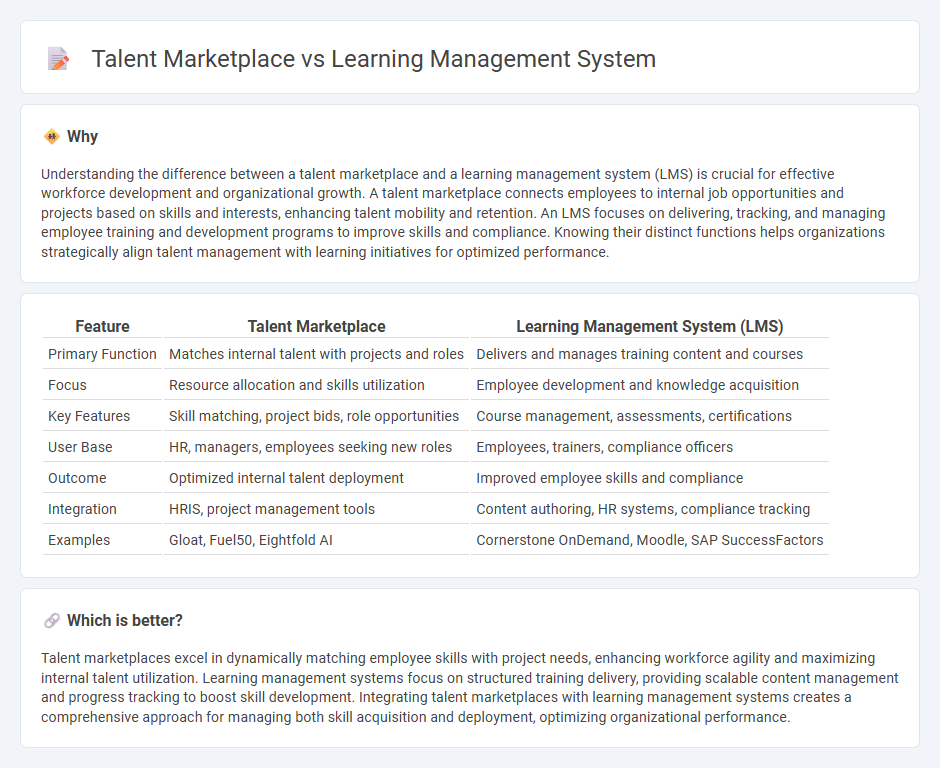
Talent marketplaces connect employees with project opportunities based on their skills, enabling agile workforce deployment and maximizing internal talent utilization, while learning management systems (LMS) focus on delivering, tracking, and managing employee training programs to enhance skill development. Both platforms serve strategic HR goals but address different aspects of talent management--marketplaces drive work engagement and resource allocation, whereas LMS fosters continuous learning and compliance. Explore how integrating talent marketplaces and LMS can transform organizational agility and employee growth.
Why it is important
Understanding the difference between a talent marketplace and a learning management system (LMS) is crucial for effective workforce development and organizational growth. A talent marketplace connects employees to internal job opportunities and projects based on skills and interests, enhancing talent mobility and retention. An LMS focuses on delivering, tracking, and managing employee training and development programs to improve skills and compliance. Knowing their distinct functions helps organizations strategically align talent management with learning initiatives for optimized performance.
Comparison Table
| Feature | Talent Marketplace | Learning Management System (LMS) |
|---|---|---|
| Primary Function | Matches internal talent with projects and roles | Delivers and manages training content and courses |
| Focus | Resource allocation and skills utilization | Employee development and knowledge acquisition |
| Key Features | Skill matching, project bids, role opportunities | Course management, assessments, certifications |
| User Base | HR, managers, employees seeking new roles | Employees, trainers, compliance officers |
| Outcome | Optimized internal talent deployment | Improved employee skills and compliance |
| Integration | HRIS, project management tools | Content authoring, HR systems, compliance tracking |
| Examples | Gloat, Fuel50, Eightfold AI | Cornerstone OnDemand, Moodle, SAP SuccessFactors |
Which is better?
Talent marketplaces excel in dynamically matching employee skills with project needs, enhancing workforce agility and maximizing internal talent utilization. Learning management systems focus on structured training delivery, providing scalable content management and progress tracking to boost skill development. Integrating talent marketplaces with learning management systems creates a comprehensive approach for managing both skill acquisition and deployment, optimizing organizational performance.
Connection
Talent marketplaces and learning management systems (LMS) are interconnected through their role in optimizing workforce development and talent mobility within organizations. Talent marketplaces leverage LMS data to identify skill gaps, recommend targeted training, and facilitate internal job matching based on employees' verified competencies. Integrating LMS with talent marketplaces enhances personalized learning pathways, promotes continuous skill development, and supports strategic talent management aligned with organizational goals.
Key Terms
**Learning Management System:**
Learning management systems (LMS) are designed to deliver, track, and manage employee training programs efficiently, supporting compliance, skill development, and performance improvement. Key features include course creation, assessment tools, reporting analytics, and integration with HR systems to monitor learner progress and competencies. Explore how an LMS can transform your organization's training strategy and boost workforce capabilities.
Course Delivery
A learning management system (LMS) primarily focuses on structured course delivery, enabling organizations to create, manage, and track educational content and learner progress efficiently. Talent marketplaces emphasize dynamic skill matching and project-based assignments, often integrating learning opportunities within real-time work scenarios to enhance workforce agility. Explore how these platforms shape modern training strategies to optimize employee development.
Progress Tracking
Learning management systems (LMS) specialize in detailed progress tracking through course completions, quiz scores, and certification rates, offering granular insights into learner performance. Talent marketplaces emphasize skill-based progress metrics, aligning learning milestones with real-time job opportunities and project assignments for immediate application. Explore how each platform enhances workforce development by improving progress tracking and skill mapping.
Source and External Links
What is a Learning Management System (LMS)? - TechTarget - A learning management system (LMS) is a software application or web-based technology used to plan, implement, and assess a specific learning process, often providing tools for content delivery, student monitoring, and performance assessment in education and enterprise settings.
Learning management system - Wikipedia - An LMS is software for administration, documentation, tracking, and delivery of educational or training programs, with origins in e-Learning and broad adoption in higher education and corporate training, especially for remote learning.
What Are Learning Management Systems, and How do you Choose ... - LMSs are platforms used by companies to create, distribute, and manage online learning programs, enabling monitoring of employee progress, providing analytics, and supporting course creation and feedback collection.
 dowidth.com
dowidth.com